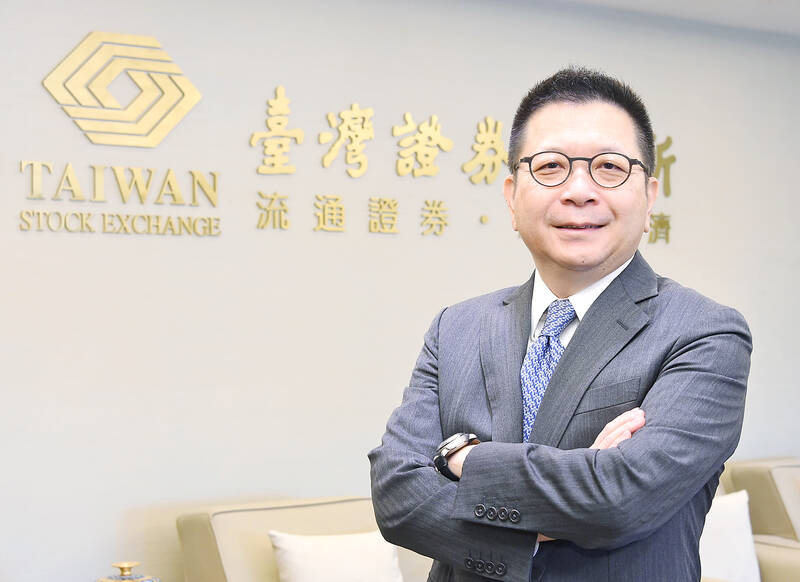The Taiwan Stock Exchange (TWSE) is focusing on attracting a new crop of innovation and technology companies in an effort to build investor interest and diversify the nation’s equity market, an official said on Thursday.
Trading on the TWSE is dominated by Taiwan Semiconductor Manufacturing Co (TSMC, 台積電), which accounts for one-third of the weighting in the benchmark TAIEX.
However, the creation of the Taiwan Innovation board, which groups companies in silos such as green energy, digital services, lifestyle and leisure industries, has helped investors better identify their areas of interest, TWSE chairman and CEO Sherman Lin (林修銘) said in an interview in New York.

Photo: Tu Chien-jung, Taipei Times
There is no plan to artificially limit TSMC’s dominance in the index. Rather, the idea is that the massive chipmaker would help attract smaller, newer companies to the exchange, making the index more balanced and diversified, Lin said.
However, this evolution would not happen overnight.
“Things cannot change suddenly,” Lin said.
Lin is meeting with institutional investors and asset managers in New York and Boston this week, urging portfolio managers to look beyond TSMC to its smaller and newer peers, which have the potential to grow as big as the chipmaking giant — the main supplier for Apple Inc and Nvidia Corp.
US foreign investors accounted for more than 40 percent of foreign capital in Taiwan’s stock market, making it the exchange’s largest source of foreign investment.
TWSE is also exploring the possibility of cross listing exchange-traded funds to track Japanese and Taiwanese securities in each other’s markets, Lin said.
The stock exchange operator has already launched similar products with South Korea’s stock exchange.

NEW IDENTITY: Known for its software, India has expanded into hardware, with its semiconductor industry growing from US$38bn in 2023 to US$45bn to US$50bn India on Saturday inaugurated its first semiconductor assembly and test facility, a milestone in the government’s push to reduce dependence on foreign chipmakers and stake a claim in a sector dominated by China. Indian Prime Minister Narendra Modi opened US firm Micron Technology Inc’s semiconductor assembly, test and packaging unit in his home state of Gujarat, hailing the “dawn of a new era” for India’s technology ambitions. “When young Indians look back in the future, they will see this decade as the turning point in our tech future,” Modi told the event, which was broadcast on his YouTube channel. The plant would convert

‘SEISMIC SHIFT’: The researcher forecast there would be about 1.1 billion mobile shipments this year, down from 1.26 billion the prior year and erasing years of gains The global smartphone market is expected to contract 12.9 percent this year due to the unprecedented memorychip shortage, marking “a crisis like no other,” researcher International Data Corp (IDC) said. The new forecast, a dramatic revision down from earlier estimates, gives the latest accounting of the ongoing memory crunch that is affecting every corner of the electronics industry. The demand for advanced memory to power artificial intelligence (AI) tasks has drained global supply until well into next year and jeopardizes the business model of many smartphone makers. IDC forecast about 1.1 billion mobile shipments this year, down from 1.26 billion the prior

People stand in a Pokemon store in Tokyo on Thursday. One of the world highest-grossing franchises is celebrated its 30th anniversary yesterday.

Zimbabwe’s ban on raw lithium exports is forcing Chinese miners to rethink their strategy, speeding up plans to process the metal locally instead of shipping it to China’s vast rechargeable battery industry. The country is Africa’s largest lithium producer and has one of the world’s largest reserves, according to the US Geological Survey (USGS). Zimbabwe already banned the export of lithium ore in 2022 and last year announced it would halt exports of lithium concentrates from January next year. However, on Wednesday it imposed the ban with immediate effect, leaving unclear what the lithium mining sector would do in the